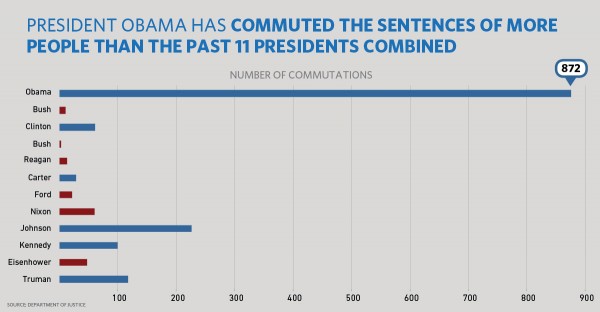Obama commutes sentences for 98 more prisoners, 42 of them lifers

President Barack Obama. Frederic Legrand - COMEO / Shutterstock.com
President Barack Obama commuted 98 more sentences of federal prisoners, the White House announced on Thursday.
According to a Department of Justice press release, all 98 recipients had been sentenced for drug crimes; some also had convictions for offenses that may be related to drugs, such as firearms possession and money laundering. Forty-two of the 98 had been sentenced to life in prison. Many of their new sentences expire Oct. 27, 2018 or Feb. 24, 2017; other sentences were commuted to a smaller number of months than the original sentence.
The Clemency Project 2014, the large pro bono program seeking to help Obama’s clemency initiative, says more than 60 of the 98 commutations came through the project. Among those was the case of Brett Poore, who was convicted in 2005 of methamphetamine charges. Poore was represented by attorneys at Ballard Spahr, where CP14 steering committee member Margie Peerce is a partner. Peerce told the Washington Post that Poore earned his GED in prison and took vocational courses.
“What is consistent throughout, and one of the things that has amazed me throughout this process, is that even people who are serving life sentences have tried to better themselves while in prison,” Peerce said to the Post.
The commutations come just weeks after Obama commuted 102 other sentences Oct. 6, bringing his total to 200 commutations for the month and 872 for his entire presidency. That’s more commutations than those of his 11 predecessors combined, the White House pointed out. CP14 says more than 410 of those came through the project.
More are likely. As CP14’s press release notes, Deputy Attorney General Sally Yates said Tuesday that there will be “many more [commutations] to come.” CP14 also notes that while most of the applications it received did not meet clemency criteria, it has submitted more than 2,150 petitions to the DOJ’s Office of the Pardon Attorney. President Obama has just under three months remaining in office to take action.
The ABA’s Criminal Justice Section is one of the five groups helping organize CP14, along with Families Against Mandatory Minimums, the National Association of Criminal Defense Lawyers, the ACLU and federal public defenders.
CP14 has been criticized as too slow by some sentencing reform advocates, a criticism that Peerce rejected in her remarks to the Post. The Post noted that some advocates are calling for blanket clemency for all nonviolent offenders who have served at least 10 years of their sentences.
Professor P.S. Ruckman, who teaches political science at Northern Illinois University and blogs at Pardon Power, calls the president’s recent spate of commutations “the greatest last-minute clemency surge in American history.”
However, Ruckman notes, the “grueling” application process at CP14—applications see multiple levels of review at CP14, the DOJ and the White House—means these applications may not be truly last-minute. And, Ruckman said in August, despite the massive growth in late-term commutations, Obama’s pardons—which erase convictions, not just sentences—fall short compared to all of his predecessors from 1948 onward.




